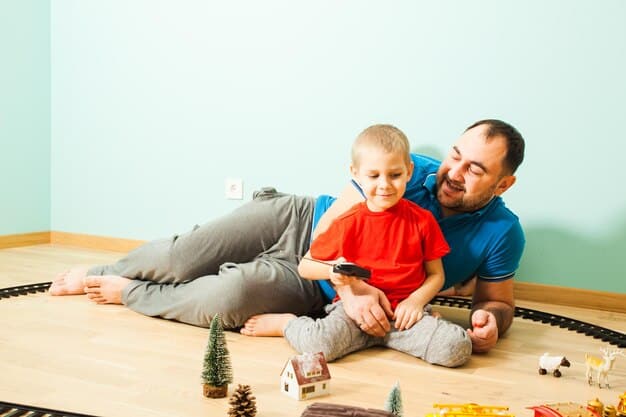Active Listening: A Single Dad’s Guide to Deeper Connections

Active listening is crucial for single dads aiming to connect deeply with their children, fostering trust, understanding, and a stronger bond through focused, empathetic communication.
Being a single dad comes with its own set of challenges, and navigating the emotional landscape of your children can sometimes feel overwhelming. However, one of the most powerful tools you have at your disposal is the ability to practice the importance of active listening: connecting with your children on a deeper level as a single dad is a skill that can transform your relationships and create a stronger bond with your kids.
Understanding Active Listening
Active listening is more than just hearing the words your children say. It’s about fully engaging with them, understanding their emotions, and responding in a way that shows you truly care. It requires patience, empathy, and a willingness to put aside your own thoughts and feelings to focus entirely on theirs.
Active listening builds trust, fosters open communication, and allows you to truly understand your child’s perspective. It can also help you identify potential issues early on, preventing them from escalating into bigger problems.
Key Components of Active Listening
Several components contribute to effective active listening. These include paying attention, showing that you’re listening, providing feedback, deferring judgment, and responding appropriately. Each of these elements plays a crucial role in creating a supportive and understanding environment for your children.
- Paying attention involves giving your child your undivided focus, minimizing distractions, and making eye contact.
- Showing that you’re listening can be achieved through verbal cues like “I see” or “uh-huh,” as well as non-verbal cues like nodding and maintaining an open posture.
- Providing feedback includes summarizing your child’s points to ensure you understand them correctly and asking clarifying questions.
- Deferring judgment means setting aside your own opinions and avoiding criticism while your child is speaking.
- Responding appropriately involves being honest, empathetic, and supportive in your reactions.
By incorporating these components into your interactions, you can create a space where your children feel safe, valued, and understood.
In summary, understanding active listening involves more than just hearing the words spoken; it’s about fully engaging with your children, demonstrating empathy, and responding in a manner that fosters trust and open communication.
Creating a Safe Space for Communication
For children, especially those navigating the complexities of a single-parent household, feeling safe to express their thoughts and emotions is paramount. Creating a safe space involves consistent effort and a commitment to providing unwavering support.
When children feel they can express themselves without judgment, they are more likely to share their concerns, dreams, and fears, paving the way for deeper emotional connections and a stronger relationship.

The Role of Trust in Open Communication
Trust forms the foundation of any strong relationship, and it’s particularly vital between a single dad and his children. When children trust their father, they feel more comfortable sharing their innermost thoughts and feelings. Trust is built over time through consistent actions, honesty, and reliability.
- Being honest and transparent with your children, even about difficult topics, demonstrates respect and builds trust.
- Keeping your promises, no matter how small, reinforces the idea that you are someone they can rely on.
- Showing empathy and understanding their perspectives, even when you don’t agree, fosters a sense of validation and security.
These consistent actions communicate that you are a safe person to confide in, regardless of the circumstances.
In essence, creating a safe space for communication hinges on building trust through consistent actions, honesty, and empathy, which encourages children to openly share their thoughts and feelings.
Overcoming Communication Barriers
As a single dad, you may encounter communication barriers that can hinder your ability to connect with your children. These barriers can range from distractions and time constraints to differences in communication styles and emotional reactivity.
Identifying these barriers is the first step toward overcoming them, enabling you to create a more open and understanding environment for communication.
Common Barriers to Active Listening
Several factors can impede active listening, including distractions, preconceived notions, and emotional reactions. Recognizing these barriers can help you take steps to minimize their impact on your interactions with your children.
- Minimizing distractions such as phones, television, or other interruptions can help you focus fully on your child’s words.
- Setting aside preconceived notions and biases can help you approach conversations with an open mind.
- Managing your own emotional reactions can prevent you from becoming defensive or dismissive of your child’s feelings.
By addressing these barriers, you can create a calmer, more attentive environment for meaningful conversations.

Ultimately, overcoming communication barriers involves recognizing and addressing factors like distractions and emotional reactions, thereby enhancing your ability to listen actively and connect with your children.
Practical Tips for Active Listening
Active listening is a skill that can be developed and refined through practice. By using practical techniques and focusing on specific behaviors, you can enhance your ability to connect with your children on a deeper level.
These strategies will help you not only hear what your children are saying but also truly understand their perspectives and emotions, fostering a more supportive and understanding relationship.
Strategies for Effective Communication
There are several actionable strategies you can employ to become a more effective active listener. These include using open-ended questions, summarizing and reflecting, and avoiding interruptions.
- Open-ended questions encourage your children to elaborate and share more details. For example, instead of asking “Did you have a good day?” try asking “What was the best part of your day?”
- Summarizing and reflecting involves restating what you’ve heard to ensure you understand it accurately. For instance, you might say, “So, it sounds like you were feeling frustrated when…”
- Avoiding interruptions allows your children to complete their thoughts without feeling rushed or cut off. Practice patience and give them the space to fully express themselves.
By integrating these strategies into your routine, you can create a communication style that enhances mutual understanding and strengthens your connection with your children.
In short, utilizing practical tips such as asking open-ended questions and avoiding interruptions can significantly improve your active listening skills and enhance your communication with your children.
Benefits of Active Listening
The benefits of active listening extend far beyond simply improving communication. It can lead to stronger relationships, increased empathy, and a deeper understanding of your children’s needs and emotions.
By truly listening to your children, you create a foundation of trust and support that can help them navigate the challenges of life and develop into confident, well-adjusted individuals.
Long-Term Impact on Parent-Child Relationship
Active listening has a lasting impact on the parent-child relationship, fostering a sense of connection and mutual respect that can endure for years to come. Children who feel heard and understood are more likely to develop a strong bond with their parents, leading to greater emotional well-being and resilience.
- Enhanced emotional resilience: Children who practice open communication are better equipped to handle stress and adversity.
- Stronger family bonds: Active listening strengthens the connection between family members.
- Improved mental health: Feeling heard contributes to a child’s overall emotional well-being.
By prioritizing active listening, you are investing in the long-term health and happiness of your family.
All things considered, active listening not only improves immediate communication but also fosters lasting connections and enhances the overall well-being of both parent and child, ensuring a stronger, more resilient relationship.
Maintaining Consistency
Consistency is crucial when practicing active listening, as it reinforces the message that you are always there to support and understand your children. Consistent effort builds trust and creates a reliable foundation for open communication.
Regularly engaging in active listening can transform your relationship with your children, making it more meaningful and supportive over time.
Integrating Active Listening into Daily Life
Integrating active listening into your daily life can be achieved through small, consistent actions and habits. Whether it’s during mealtimes, bedtime routines, or casual conversations, making an effort to truly listen can make a significant difference.
Here are small steps to follow on a daily basis:
- Set aside dedicated time each day to talk with your children without distractions.
- Be fully present during these conversations, giving them your complete attention.
- Practice patience and avoid interrupting or offering unsolicited advice.
By making active listening a regular part of your interactions, you reinforce the message that their thoughts and feelings are valued and important. This, in turn, strengthens your connection and creates a more supportive family environment.
Ultimately, consistency in active listening, achieved through dedicated time and genuine presence, solidifies trust and strengthens the parent-child bond, making it a sustainable part of daily family life.
| Key Point | Brief Description |
|---|---|
| 👂 Active Listening | Engaging fully with your child’s words and emotions. |
| 🛡️ Safe Space | Creating an environment where children feel secure to express themselves. |
| 🚫 Overcoming Barriers | Minimizing distractions and managing emotional reactions. |
| 🔄 Consistency | Regularly practicing active listening to build trust. |
FAQ
▼
Active listening is fully concentrating, understanding, responding, and remembering what someone is saying. It involves not just hearing the words, but also paying attention to the emotions behind them.
▼
Build trust by being honest and reliable. Show empathy, avoid judgment, and consistently validate their feelings, making them feel safe and understood.
▼
Common barriers include distractions, preconceived notions, and emotional reactions. Minimize distractions, approach conversations with an open mind, and manage your emotions to remain receptive.
▼
Use open-ended questions, summarize and reflect what you’ve heard, and avoid interrupting. These techniques encourage your children to share more and ensure you understand correctly.
▼
Active listening fosters stronger bonds, enhances emotional resilience, and improves mental health. It helps build a foundation of trust and mutual respect, leading to a more resilient and supportive relationship.
Conclusion
Embracing the principles of the importance of active listening: connecting with your children on a deeper level as a single dad is an investment in your children’s well-being and the strength of your family. By making a conscious effort to listen actively, you can create a more supportive environment, foster open communication, and build lasting bonds that will enrich your lives for years to come.





